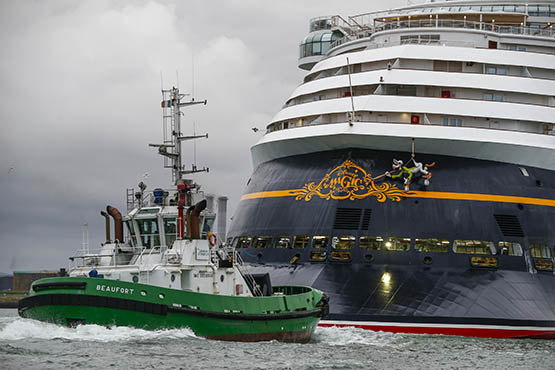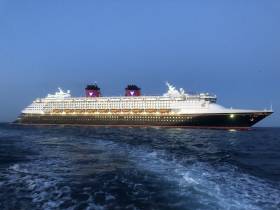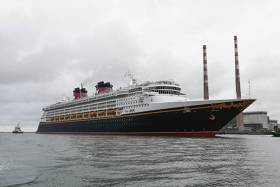Displaying items by tag: Disney Magic
Disney Magic Makes Maiden Call to Port of Cork
#CruiseLiners - Disney Magic made a maiden call to the Port of Cork this morning.
The Port of Cork welcomed the Disney Magic on the maiden call to Cobh, as part of Disney Cruise Line’s new seven-night British Isles cruise. Capable of holding 2,713 guests and 950 crew, the Disney Magic is designed primarily with the family in mind.
To mark the Disney Magic’s maiden call and to ensure a warm welcome for the passengers to Cobh, a number of free family focused events will take place from 2.30pm on the promenade in Cobh. These include an outdoor ball pool trailer, balloon modelling, face painting, a ‘Tony Balone’ magic show and family friendly music on the bandstand. The Cobh Confraternity Band will play on the bandstand as the liner departs and Disney Cruise Line has confirmed as a special bonus; the Disney characters will be out on deck to wave goodbye as the liner passes the promenade in Cobh.
Chief Executive Brendan Keating said: ‘Welcoming the Disney Magic to Cork is a real honour for the Port of Cork and we look forward to further calls from this admired cruise line.’
Disney Cruise Line described Cork as ‘home to a vibrant culinary scene and a plethora of pubs, shops and cafes. It invites visitors to connect with Ireland’s ancient past, with historic sites like Blarney Castle, where visitors can kiss the famed Blarney Stone.’
Following a request by Disney Cruise Line the Deep-water Quay in Cobh will be closed to the public from 2pm until the Disney Magic departs at 6.15pm. The Port of Cork is encouraging anyone coming to Cobh to see the ship to view it from the High Road or promenade, and to follow traffic signs for parking in the town.
Dublin Port today became the first – and only – Irish port of call for Disney Magic on her maiden voyage to Irish shores. The ship’s 3,650 passengers, cast and crew were greeted by an entertainment spectacle on the quayside in Dublin Port. The 300m, 11-deck luxury liner is one of 113 cruise ships scheduled to call at Dublin Port in 2016. Pictured were two characters onboard Disney Magic. At the same time this morning, the German Liner Mein Schiff 1 has docked off Dun Laoghaire Harbour.
She arrived in the early hours of this morning carrying over 2,700 passengers and 950 cast and crew. The ship’s passengers were greeted by a ‘Game of Thrones’ inspired entertainment spectacle on the quayside in Dublin Port featuring music, drummers, dancers, entertainers, with Irish hounds and handlers.
As passengers disembarked they received a Cruise Dublin Visitor Pass, the new visitor card launched by Cruise Dublin, the Cruise Tourism Development and Marketing agency established to grow Dublin as Ireland’s premier port of choice for cruise. The pass provides special admission to a range of historic, cultural and sporting attractions, as well as incentives to shop and eat out at participating retailers, bars and restaurants in the city.
Dublin is the only Irish port of call for Disney Magic as part of a 12 night transatlantic cruise starting in Port Canaveral, Florida and finishing in Dover, England. The selection by Disney Cruise Line of Dublin as its chosen destination in Ireland highlights Dublin’s growing international reputation as a marquee destination for cruise tourism. Disney Cruise Line now joins a long list of the world’s largest cruise lines choosing to routinely call to Dublin Port. She will visit Dublin Port again on 13th June 2016.
On board, the ship encapsulates the glamour of the golden age of ocean travel. The ship’s Art Deco interior features specially commissioned paintings, sculptures and woodwork, as well as rare animation cells from the Disney archive. Awash with Disney inspired dining, theatre, leisure and entertainment facilities, the cruise line prides itself on offering age-appropriate play spaces and activities to provide everyone from toddlers to late teens with a Disney experience on board.

Pat Ward, Head of Corporate Services at Dublin Port Company, said; “Disney Magic is a spectacular ship and a very welcome sight for the city today. She is one of 113 cruise calls scheduled for Dublin Port this year, and undoubtedly a highlight of the season. Cruise is a dynamic business, and driven by passenger demand. As a result of that demand, we expect this to be Dublin Port’s biggest year on record for cruise. The season now routinely stretches to December, and the type of passengers arriving include younger families and those looking to explore the city unaccompanied. In response to those trends, the new Cruise Dublin Visitor Pass will help passengers make the most of their visit, while helping to support the city’s retailers and tourism offering.”
At 300 metres long, Disney Magic is at the upper limit of Dublin Port’s operational limit on ship length, i.e. able to enter Dublin Port and turn within the River Liffey.
Work has already commenced on the €230m ABR Project which will expand capacity in Dublin Port and will be largely completed in four years. The ABR Project, once complete, will mean that larger ships will be able to routinely call at Dublin Port, turn within the expanded Alexandra Basin West and berth as far upriver as East Link Bridge.































































